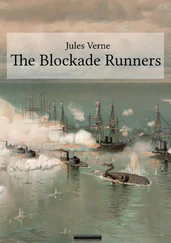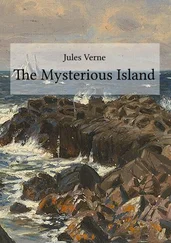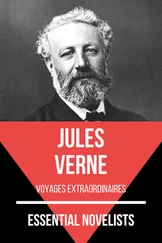“You see, Mr. Clawbonny,” Johnson used to say, “this country is not like all others; they call it Green land, but there are very few weeks in the year when it justifies its name.”
“Who knows if in the tenth century this land did not justify its name?” added the doctor. “More than one revolution of this kind has been produced upon our globe, and I daresay I should astonish you if I were to tell you that according to Icelandic chronicles two thousand villages flourished upon this continent about eight or nine hundred years ago.”
“You would so much astonish me, Mr. Clawbonny, that I should have some difficulty in believing you, for it is a miserable country.”
“However miserable it may be, it still offers a sufficient retreat to its inhabitants, and even to civilised Europeans.”
“Without doubt! We met men at Disko and Uppernawik who consented to live in such climates; but my ideas upon the matter were that they lived there by compulsion and not by choice.”
“I daresay you are right, though men get accustomed to everything, and the Greenlanders do not appear to me so unfortunate as the workmen of our large towns; they may be unfortunate, but they are certainly not unhappy. I say unhappy, but the word does not translate my thought, for if these people have not the comforts of temperate countries, they are formed for a rude climate, and find pleasures in it which we are not able to conceive.”
“I suppose we must think so, as Heaven is just. Many, many voyages have brought me upon these coasts, and my heart always shrinks at the sight of these wretched solitudes; but they ought to have cheered up these capes, promontories, and bays with more engaging names, for Farewell Cape and Desolation Cape are not names made to attract navigators.”
“I have also remarked that,” replied the doctor, “but these names have a geographical interest that we must not overlook. They describe the adventures of those who gave them those names. Next to the names of Davis, Baffin, Hudson, Ross, Parry, Franklin, and Bellot, if I meet with Cape Desolation I soon find Mercy Bay; Cape Providence is a companion to Port Anxiety; Repulsion Bay brings me back to Cape Eden, and leaving Turnagain Point I take refuge in Refuge Bay. I have there under my eyes an unceasing succession of perils, misfortunes, obstacles, successes, despairs, and issues, mixed with great names of my country, and, like a series of old-fashioned medals, that nomenclature retraces in my mind the whole history of these seas.”
“You are quite right, Mr. Clawbonny, and I hope we shall meet with more Success Bays than Despair Capes in our voyage.”
“I hope so too, Johnson; but, I say, is the crew come round a little from its terrors?”
“Yes, a little; but since we got into the Straits they have begun to talk about the fantastic captain; more than one of them expected to see him appear at the extremity of Greenland; but between you and me, doctor, doesn’t it astonish you a little too?”
“It does indeed, Johnson.”
“Do you believe in the captain’s existence?”
“Of course I do.”
“But what can be his reasons for acting in that manner?”
“If I really must tell you the whole of my thoughts, Johnson, I believe that the captain wished to entice the crew far enough out to prevent them being able to come back. Now if he had been on board when we started they would all have wanted to know our destination, and he might have been embarrassed.”
“But why so?”
“Suppose he should wish to attempt some superhuman enterprise, and to penetrate where others have never been able to reach, do you believe if the crew knew it they would ever have enlisted? As it is, having got so far, going farther becomes a necessity.”
“That’s very probable, Mr. Clawbonny. I have known more than one intrepid adventurer whose name alone was a terror, and who would never have found any one to accompany him in his perilous expeditions–-“
“Excepting me,” ventured the doctor.
“And me, after you,” answered Johnson, “and to follow you; I can venture to affirm that our captain is amongst the number of such adventurers. No matter, we shall soon see; I suppose the unknown will come as captain on board from the coast of Uppernawik or Melville Bay, and will tell us at last where it is his good pleasure to conduct the ship.”
“I am of your opinion, Johnson, but the difficulty will be to get as far as Melville Bay. See how the icebergs encircle us from every point! They scarcely leave a passage for the Forward . Just examine that immense plain over there.”
“The whalers call that in our language an icefield, that is to say a continued surface of ice the limits of which cannot be perceived.”
“And on that side, that broken field, those long pieces of ice more or less joined at their edges?”
“That is a pack; if it was of a circular form we should call it a patch; and, if the form was longer, a stream.”
“And there, those floating icebergs?”
“Those are drift-ice; if they were a little higher they would be icebergs or hills; their contact with vessels is dangerous, and must be carefully avoided. Here, look over there: on that icefield there is a protuberance produced by the pressure of the icebergs; we call that a hummock; if that protuberance was submerged to its base we should call it a calf. It was very necessary to give names to all those forms in order to recognise them.”
“It is truly a marvellous spectacle!” exclaimed the doctor, contemplating the wonders of the Boreal Seas; “there is a field for the imagination in such pictures!”
“Yes,” answered Johnson, “ice often takes fantastic shapes, and our men are not behindhand in explaining them according to their own notions.”
“Isn’t that assemblage of iceblocks admirable? Doesn’t it look like a foreign town, an Eastern town, with its minarets and mosques under the pale glare of the moon? Further on there is a long series of Gothic vaults, reminding one of Henry the Seventh’s chapel or the Houses of Parliament.”
“They would be houses and towns very dangerous to inhabit, and we must not sail too close to them. Some of those minarets yonder totter on their base, and the least of them would crush a vessel like the Forward .”
“And yet sailors dared to venture into these seas before they had steam at their command! How ever could a sailing vessel be steered amongst these moving rocks?”
“Nevertheless, it has been accomplished, Mr. Clawbonny. When the wind became contrary—and that has happened to me more than once—we quietly anchored to one of those blocks, and we drifted more or less with it and waited for a favourable moment to set sail again. I must acknowledge that such a manner of voyaging required months, whilst with a little good fortune we shall only want a few days.”
“It seems to me,” said the doctor, “that the temperature has a tendency to get lower.”
“That would be a pity,” answered Johnson, “for a thaw is necessary to break up these masses and drive them away into the Atlantic; besides, they are more numerous in Davis’s Straits, for the sea gets narrower between Capes Walsingham and Holsteinborg; but on the other side of the 67th degree we shall find the seas more navigable during the months of May and June.”
“Yes; but first of all we must get to the other side.”
“Yes, we must get there, Mr. Clawbonny. In June and July we should have found an open passage, like the whalers do, but our orders were precise; we were to be here in April. I am very much mistaken if our captain has not his reasons for getting us out here so early.”
The doctor was right in stating that the temperature was lowering; the thermometer at noon only indicated 6 degrees, and a northwest breeze was getting up, which, although it cleared the sky, assisted the current in precipitating the floating masses of ice into the path of the Forward . All of them did not obey the same impulsion, and it was not uncommon to encounter some of the highest masses drifting in an opposite direction, seized at their base by an undercurrent.
Читать дальше












